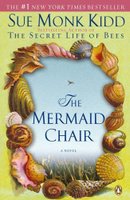This is the second book I've read by Kidd, and enjoyed both of them. So much truth. Jessie grew up on Egret Island and her mother is still there. Her mother does something insane, and she goes back to live with her mother for a while and try to help her become healthier. But, she hasn't been back to this island off the coast of New England for many years. She's married to Hugh and they have a daughter named Dee. Going back to her roots is both good and bad, as so often the case. She begins to discover that she is her own person and not just who others want her to be.
There are three women who are bound together. Nelle, Kat, and Hepzibah. Three women with strong character and an ability to love each other in spite of their large differences. Hepzibah loves the Gullah culture, which is the culture of slaves who came to live on the island after slavery. (Sort of true. Not this particular island because it doesn't exist, but islands in similar places that really did and do exist.) Their culture and myths and beliefs got mixed in with some of the traditions of the islanders. Kat loves to have her own opinion, keep her own hours, say the unexpected, and push peoples' boundaries. Nelle has turned to religion to keep her sane, helping to keep meals for the monks at the nearby abbey. As a result of a horrible thing that happened many years ago tries to leave behind everything that reminds her of it. Together they hold one another up, challenging, loving, accepting, understanding one another. so refreshing. As humans we are made to be in deep, lasting relationships. Not just marriage, but also friendships that give us true glimpses of what it means to be known and loved.
Jessie's mother, Nelle, has started to do crazy things. Which it turns out are her way of trying to relieve the guilt of something that happened twenty some years ago. This guilt is not just her own, but also happens to belong to others who know the secret. (Spoiler coming!) All her life, Jessie believed that her father died on a boat because of a spark from the pipe she had given him as a present. On this trip to the island, she was looking in the drawer of sacred things (broken rosaries and crosses, the newspaper clipping of her father's death, etc.) and at the back she found the pipe. Didn't know what to make of that. But the climax comes when Kat decides that they need to speak the truth. That Nelle will only be set free when the truth is finally revealed. Her father chose to die instead of slowly losing all memory as his father had done, and a number of people were involved to make it a sacrament of sorts. The boat accident was a cover up. Jessie is hurt and surprised and anguished to find out about this thing that happened so long ago, but at the same time she is relieved to finally know the truth. It was already in her bones. Somehow truth imprints itself on our bones and bodies and when we find it there is a sense it has already belonged. This is such a Biblical concept -- that the truth will set us free. To live what we know is real life, in the strength and freedom only God can give to us.
Brother Thomas, previously known as Whit, plays a major role as well. He is a catalyst. He is more than that, but that is a piece of what he does in the book. He is a monk who came to the abbey to find God. To take a breath and see what it was like to live outside of the cares of the world. His devotion, passion, commitment to God and the abbey are characteristics which draw Jessie to him. There are other things like lust and proximity, but the single-hearted commitment is something she does not have in herself. By having an affair with him, she damages his commitments (which is bad), but it somehow helps both of them to choose to live life fully again. I do not believe that sin is ever good. Sure, God can use evil for His own purposes -- but that does not mean it was good in the first place to choose poorly. Seems like this book could be taken that way -- that the affair was good because the end was good. But the end does not justify the means -- even when the end seems right.
| Title: | The Mermaid Chair |
|---|---|
| Author: | Sue Monk Kidd |
| Date published: | 2005 |
| Genre: | Fiction |
| Number of pages: | 332 |



0 comments:
Post a Comment